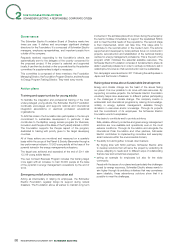APC 2011 Annual Report Download - page 82
Download and view the complete annual report
Please find page 82 of the 2011 APC annual report below. You can navigate through the pages in the report by either clicking on the pages listed below, or by using the keyword search tool below to find specific information within the annual report.
REGISTRATION DOCUMENT 2011 SCHNEIDER ELECTRIC80
SUSTAINABLE DEVELOPMENT
2COMMITTED TO AND ON BEHALF OFEMPLOYEES
Midwest Regional Joint Board, Worker’s United which manufactures
the Juno Lighting brand.
Social dialogue in Mexico
In Mexico, Schneider Electric leaders have regular communication
with the employees on topics related to their jobs: this communication
takes place in different ways, including large communication
meetings and small group conversations. There is also continuous
communication with the Union leaders and delegates of three
national Unions which represent unionized employees. Schneider
Electric keeps them informed of internal and external issues
impacting the company’s results, listen to their concerns and look
for alignment with the company strategy and challenges.
Schneider Electric and the Unions have negotiations regarding
salaries and every two years the contracts are reviewed. In
2011, Schneider Electric negotiated salary agreements in all the
manufacturing and distribution facilities as well as benefi ts in fi ve
manufacturing plants.
Social dialogue in China
In China, new labour laws, which refer to several important work-
related issues, came into force in 2008. Schneider Electric fully
complies with the new Chinese law:
•Schneider Electric union is established and is functioning in
China, it is engaged with city trade union;
•the Group is under discussion with city trade union on how to
deal with collective contract, which is new in China.
Social dialogue in India
In India, social dialogue is traditionally restricted primarily to blue
collars working in factories. Schneider Electric has 31 factories
across India. Only 3 factories have Registered Trade Union, namely
Infrastructure Business at Naini, Global Suply Chain factories
at Chennai and Nasik. In these factories, social dialogue is done
through involving Unions. In all other factories, social dialogue is
organised either through Works Councils/Committees or through
direct dialogue with employees.
Schneider Electric India has a strong social dialogue culture with
both unionized and non-unionized employees (Work Committees/
Councils). These representatives periodically meet and discuss
the issues on grievances, productivity and growth. Apart from the
regular meetings, management representatives also meet with
Union or Works Council representatives based on the need. The
Unions are affi liated to the external bodies and registered under the
Trade Union Act, 1926.
The majority of Schneider Electric employees are non-unionized
(28 factories out of 31). These employees are represented
through various employee committees and councils (such as
Welfare Committee, Women’s Committee, Transport Committee,
Canteen Committee, Sports & Recreation Committee, Safety &
Health Committee, Prevention of Sexual Harassment Complaints
Committee, etc.). These committees provide a platform for
employees to represent their concerns, collective grievances
and workplace-related issues to the management. All employee
engagement programs are run through these committees with the
active participation of every employee. To maintain cordial employee
relations in the organisation and create an atmosphere of trust and
motivation, we sign every year a single or bipartite agreement on
salary and benefi ts as per the provisions of local laws for a year.
In 2011, Schneider Electric Global Supply Chain India successfully
negotiated an agreement through collective bargaining with two
Unions (Nashik and Chennai). Thereby, Schneider Electric agreed
to fi x all the terms on wages and benefi ts for next four years.
























